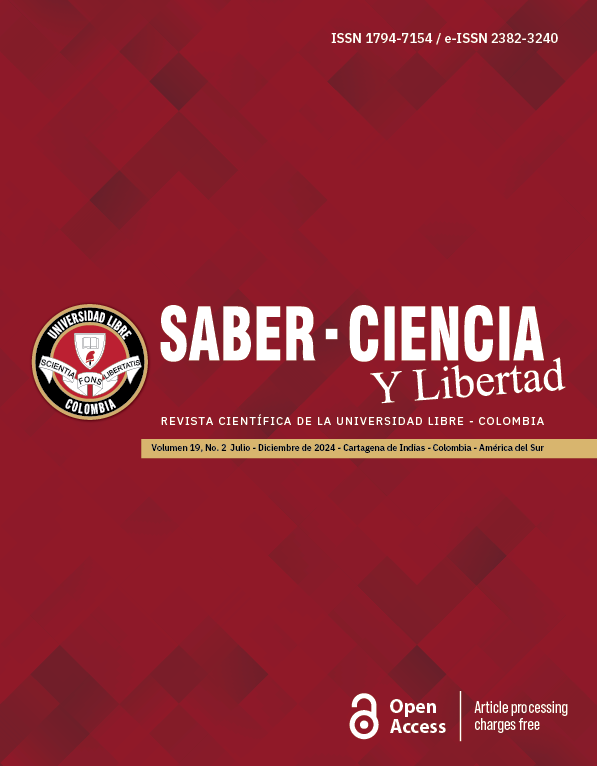Incidencia del uso de las competencias laborales en el desarrollo de la interculturalidad
DOI:
https://doi.org/10.18041/2382-3240/saber.2024v19n2.12001Palavras-chave:
Desarrollo de habilidades, cultura del trabajo, lenguaje hablado, competencia intercultural, ciudadanos globalesResumo
Este artículo de investigación se deriva de una tesis doctoral enfocada en las competencias laborales y la interculturalidad. Dicho proyecto de investigación, tiene como objetivo analizar la incidencia del uso de competencias laborales en el desarrollo de la interculturalidad en un instituto de formación para el trabajo con un grupo de 30 estudiantes colombianos matriculados en un curso de inglés de nivel 2. Debido a las tendencias actuales del mundo laboral afectado por la globalización, se llevó a cabo una investigación de tipo cualitativo. El estudio se basó en un diseño de investigación-acción, haciendo uso de técnicas como observación para el posterior análisis de las clases. De estos procesos surgieron resultados que revelaron, entre otras cosas, que el desarrollo de competencias laborales es fundamental para fomentar el liderazgo y el respeto entre diferentes culturas. A lo largo del desarrollo e implementación de los planes de clase, este trabajo pudo concluir que muchos alumnos del instituto reflejan una falta de conciencia acerca de la importancia de la interculturalidad, haciendo necesaria su investigación. Así mismo, se pudo entender que las competencias laborales, van más allá de las habilidades técnicas, y también involucran algunos factores como la comunicación, la adaptabilidad y la resolución de conflictos, los cuales contribuyen a la convivencia, el entendimiento mutuo y el éxito de las organizaciones en un mundo globalizado y diverso promoviendo el crecimiento personal y profesional de las personas. Resaltando así, la relevancia de un liderazgo inclusivo y flexible que pueda utilizar eficazmente el talento y la creatividad de un equipo multicultural, generando un ambiente más inclusivo y colaborativo.
Referências
Ansari, K. (2020). 8 Basic Tech Skills Every Employee Should Have. https://theundercoverrecruiter.com/8-tech-skills/
Bock, L. (2019). Developing Job-Related Skills for Workforce Success. Journal of Workforce Education and Development, 13(2), 1-15.
Byram, M. (1997). Teaching and Assessing Intercultural Communicative Competence.
Byram, M. (2012). Models of Intercultural Competence and the Development of Self-awareness and Self-evaluation in Intercultural Experience. Leonardo Da Vinci - Competencias lingüísticas. https://www.ces.uc.pt/icopromo/documents/08%20Michael%20Byram%20-%20Models%20of%20Intercultural%20Competence%20and%20the%20Development%20of%20Self-awareness%20and%20Self-evaluation%20in%20Intercultural%20Experience.pdf
Consejo de Europa. (s.f). Intercultural citizenship test. https://www.coe.int/en/web/interculturalcities/icc-test
Deardorff, D. (2006). Identification and assessment of intercultural competence as a student outcome of internationalization. Journal of Studies in International Education, 10(3), 241-266. https://journals.sagepub.com/doi/abs/10.1177/1028315306287002?journalCode=jsia
Deardorff, D. (2009). The SAGE Handbook of Intercultural Competence. Sage Publications. https://journals.sagepub.com/doi/abs/10.1177The%20SAGE%20Handbook%20of%20Intercultural%20Competence/1028315306287002?journalCode=jsia
Dragoni, L., Tesluk, P., Moore, O., VanKatwyk, P., Hazucha, J., and In-Sue Oh. (2014). Developing Leaders’ Strategic Thinking Through Global Work Experience: The Moderating Role of Cultural Distance. https://www.researchgate.net/profile/In-Sue-Oh/publication/268812739_Developing_Leaders'_Strategic_Thinking_Through_Global_Work_Experience_The_Moderating_Role_of_Cultural_Distance/links/5477f3180cf2a961e4847f2c/Developing-Leaders-Strategic-Thinking-Through-Global-Work-Experience-The-Moderating-Role-of-Cultural-Distance.pdf
Gudykunst, W., & Hammer, M. (2014). Bridging Differences: Effective Intergroup Communication. Sage Publications. https://sk.sagepub.com/books/bridging-differences-4e#:~:text=Bridging%20Differences%3A%20Effective%20Intergroup%20Communication%20is%20based%20on%20the%20assumption,people%20from%20our%20own%20groups.
Hanushek, E. & Woessmann, L. (2008). The Role of Cognitive Skills in Economic Development. Journal of Economic Literature 2008, 46:3, 607–668. https://www.aeaweb.org/articles?id=10.1257/jel.46.3.607
Hernández, R. (2014). Metodología de la investigación. https://www.uca.ac.cr/wp-content/uploads/2017/10/Investigacion.pdf
Hofstede, G. (1984). Culture's consequences: International differences in work-related values. Sage Publications. https://books.google.com.co/books?id=w6z18LJ_1VsC&hl=es&source=gbs_similarbooks
Huber, J. & Reynolds, C. (2014). Developing intercultural competence through education. Council of Europe Pestalozzi Series, No. 3. https://www.researchgate.net/publication/342707876_Developing_intercultural_competence_through_education_Developper_la_competence_interculturelle_par_l%27education_Developing_intercultural_competence_through_education
Jardim, J. (2021). Entrepreneurial Skills to Be Successful In the Global and Digital World: Proposal for a Frame of Reference for Entrepreneurial Education. https://www.researchgate.net/publication/351661918_Entrepreneurial_Skills_to_Be_Successful_In_the_Global_and_Digital_World_Proposal_for_a_Frame_of_Reference_for_Entrepreneurial_Education
Ministerio de Educación Nacional (2020). Articulación de la educación con el mundo productivo; Competencias Laborales Generales. Imprenta Nacional de Colombia ISBN 958-691-262-0. https://www.mineducacion.gov.co/1621/articles-106706_archivo_pdf.pdf
Nussbaum, M. (1997). Cultivating humanity: A classical defense of reform in liberal education. Harvard University Press. https://dialnet.unirioja.es/servlet/libro?codigo=606530
Rodrigues, A., Cerdeira, L., Machado-Taylor, M., and Alves, H. (2021). The importance of developing students' technological skills in higher education for their future quality of life. https://repositorio.ul.pt/bitstream/10451/50654/1/2021_INTED_The%20importance%20of%20developing%20students%27%20technological%20skills%20in%20higher%20education%20for%20their%20future%20quality%20of%20life.pdf
Downloads
Publicado
Versões
- 2025-02-11 (2)
- 2024-07-26 (1)
Edição
Seção
Licença
Copyright (c) 2025 Saber, Ciencia y Libertad

Este trabalho está licenciado sob uma licença Creative Commons Attribution-NonCommercial-ShareAlike 4.0 International License.





